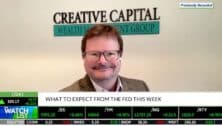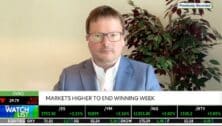Founder and CEO of Creative Capital Wealth Management Group Offers Top Alt Strategies for a Recession

As we all settle into 2024, there is increasing buzz around a possible recession and the potential for the FED to lower interest rates.
CNN reports, “Former Federal Reserve Chairman Alan Greenspan believes a U.S. recession is the ‘most likely outcome’ of the Fed’s aggressive rate hike regime meant to curb inflation. He joins a growing chorus of economists predicting an imminent economic downturn.”
Many people hear the term recession and do not know what it means or what they can do to protect their portfolio. According to Investopedia, “A recession is a significant, widespread, and prolonged downturn in economic activity. A common rule of thumb is that two consecutive quarters of negative gross domestic product (GDP) growth mean recession, although more complex formulas are also used.”
When looking for investments and strategies that will do well in a recession, in comparison to other investments, one rule of thumb, I tell my clients is to figure out if the underlying company provides a “like to have” or a “must have” to the end consumer. We will always need food, basic consumer staples, and energy. In addition, recessions often reveal opportunities at the expense of a business that expanded too much or was exposed to a major change in consumer spending.
What are the worst-performing investments during a recession? Assets that are highly leveraged (including high-yield bonds), cyclical, or speculative. Any company that offers “nice to have” but not “have to have” products or services are also vulnerable during a recession.
Accredited investments, the focus of my articles on Forbes, have some options incorporating the above investment strategies that do well during a recession.
Real Estate
There are types of real estate I would not add during a recession, however, there are defensive real estate property types and several ways to invest in them.
Here are some real estate sectors that are defensive during a recession:
• Mobile home parks
• Essential retail: pharmacies, blood dialysis centers, grocery stores, etc.
• Affordable multi-family housing: workforce housing
• Self-storage
• Medical office buildings near a referring hospital
Although you can purchase a public REIT, which is not an alternative investment, those public securities are exposed to the general stock market and, during a recession, tend to go down when the stock market goes down.
To benefit from the above real estate asset classes and not be exposed to the whims of the stock market, you need to invest more directly. There are several ways:
- You can invest in commercial real estate directly using a DST. DSTs are an alternative investment that allow accredited investors to become a partial owner of institutional real estate. This investment can be from a tax-deferred 1031 exchange or a direct cash investment into DST. The DST is owned directly and, therefore, has limited liquidity and no stock market exposure.
- Another direct investment structure for accredited investors is a Reg D offering. Again, these are not public, accredited only, and unlike a DST, you are an investor in an LLC or LP, not the actual underlying property. These tend to have more options for a “value add” type of strategy. A good example is a Reg D that buys family-owned mobile home parks and refurbishes them to increase ROI and the future value in a sale. These typically are 3-5 programs.
- Self-storage is also a recession-resistant asset class, according to the numbers for previous recessions. You can own self-storage via a DST or Reg D program, and when there is downsizing, people tend to increase their use of storage units.
Recession-resistant alternatives outside of real estate
- You could invest in recession-resistant quick-service restaurants. The rest of us call this fast food. As you probably can imagine, when things are hard, people need more affordable sources of meals, and fast food was designed to cater to that part of the economy. In a recession, upscale restaurants have a hard path to blaze, but fast food tends to do well.
- Energy is one of the most robust parts of the economy. Our entire world runs on energy, and when there is a slowdown, there is only so far you can turn down (or up) the thermostat. There is always a base demand for energy, and you could invest in oil/gas production offerings. Besides a good tax write-off, it provides income and exposure to a recession-resistant part of the economy. People might turn down their heat, but they normally can’t turn it off. Our economy needs power to run.
- Private Equity. Don’t tell your stock broker, but the thesis for investing in the stock market is basically some form of “buy, hold, hope.” In my world, “hope” is not an investment strategy. With exposure to private equity, there is an element of timing and selection. Private equity won’t buy any company unless they already know what they are going to do to improve the value of the company for a future sale. It is a “value add” type of strategy versus “buy, hold, hope.”
As you can see, there are many ways an accredited investor can play the recession. All of the above strategies have an added risk of illiquidity. Most accredited investments have a period of time that the investment is locked, and regardless of performance, an investor cannot get out. That is why it’s important to have a subject matter expert in alternative investment guide you through the process and highlight not just the pros of the investment but, more importantly, the cons of the investment.
The best part of these strategies is that if there is no recession (fingers crossed, but not likely), these strategies should still do well.
Read more at Forbes.
______
Securities are offered through Arkadios Capital. Member FINRA/SIPC. Advisory services are offered through Creative Capital Wealth Management Group. Creative Capital Wealth Management Group and Arkadios are not affiliated through any ownership.
This material was created for educational and informational purposes only and is not intended as tax, legal, or investment advice.
______

Frederick Hubler is the Founder and CEO of Creative Capital Wealth Management Group, a retainer-based wealth strategy firm specializing in alternative strategies located in Chester County.
Connect With Your Community
Subscribe to stay informed!
"*" indicates required fields












![95000-1023_ACJ_BannerAd[1]](https://vista.today/wp-content/uploads/2023/03/95000-1023_ACJ_BannerAd1.jpg)








































